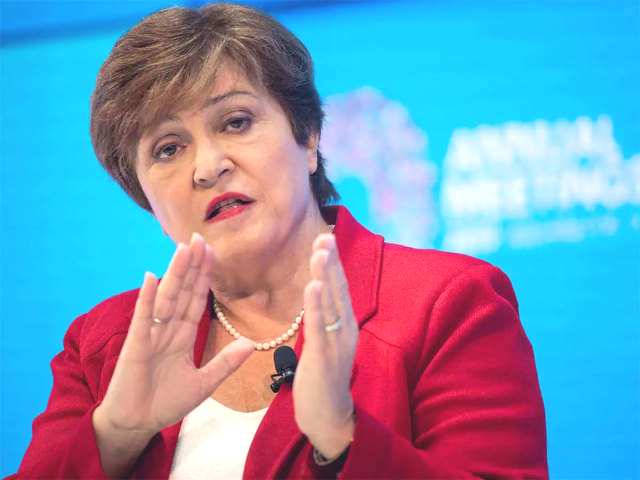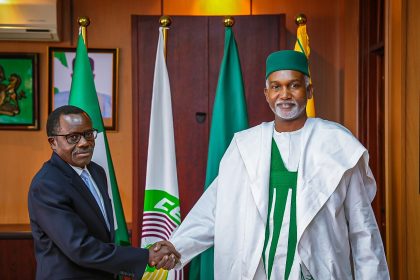IMF boss says global economy coming to standstill
 Georgieva said on Friday the highest risk the IMF sees is a wave of bankruptcies and layoffs that would make the recovery from this crisis harder.
Georgieva said on Friday the highest risk the IMF sees is a wave of bankruptcies and layoffs that would make the recovery from this crisis harder.
Participating on Friday by teleconference during a World Health Organisation briefing, Kristalina Georgieva, the International Monetary Fund Managing Director said the coronavirus pandemic is a crisis like no other. Below are her opening remarks.
“Thank you very much, Dr. Tedros (Adhanom), for the invitation, but most importantly for the work you and your staff do and I want to express from the bottom of my heart a gratitude to all health workers that are on the frontline to save lives, sometimes risking their own.
At the outset, I would like to make three points. First, this is a crisis like no other. Never in the history of the IMF, we have witnessed the world economy coming to a standstill. We are now in recession. It is way worse than the global financial crisis. And it is a crisis that requires all of us to come together. WHO is there to protect the health of people; the IMF is there to protect the health of the world economy; they both are under siege. And only united we can do our duties.
I want to stress the message that you and I have sent to the world: that saving lives and protecting livelihoods ought to go hand in hand. We cannot do one without the other. And in that spirit, we at the IMF are concentrated on making sure that there is a strong response to the health crisis as well as protecting the strength of the economy.
My second point is about emerging markets and developing economies. They are hard hit, and they have very often less resources to protect themselves against this dual crisis, health and economic crisis. We know that in many countries, health systems are weak. We know that in a flight to safety, a lot of capital has left the emerging economies, the developing world.
Nearly 90 billion dollars has flown out. This is way more than during the global financial crisis. And some countries are highly dependent on commodity exports. With prices collapsing, they’re hit yet again. It is paramount for us to place these countries and especially the weakest among them in the center of our attention. The same way the virus hits vulnerable people with medical preconditions hardest, the economic crisis hits vulnerable economies the hardest.
And that takes me to my third point. We at the IMF are mobilizing strongly, working together with the World Bank and other international financial institutions, bringing the world together to provide protection against this crisis. We have a one trillion dollars war chest and we are determined to use as much as necessary of that protecting the economy from the scarring of this crisis. We are mobilizing emergency financing assistance to countries, and I can tell you we have never seen ever such a growing demand for emergency financing.
Already over 90 countries have been placing requests to the IMF for it. And this emergency financing is to underpin the appeal that you and I are putting out. And it is: please, prioritize health expenditures, use money to pay doctors and nurses, make sure hospitals function, that there are makeshift clinics where necessary, and protect your economy, the most vulnerable people and firms so they can hold on to their workers. Because the highest risk we see is a wave of bankruptcies and layoffs that would make the recovery from this crisis harder.
Third, in this line of financial support we have the big one: one trillion. We have the emergency financing. We are also taking strong action for the poorest of our members by mobilizing grant funds to serve their duties to the IMF so they don’t have to use scarce resources today for that purpose. And together with the president of the World Bank, we put out an appeal to official bilateral creditors for the time the economy’s standing still to have debt service obligations also in a standstill. A moratorium on debt service for either countries.
Let me finish by saying that this is – in my lifetime – humanity’s darkest hour, a big threat to the whole world. And it requires from us to stand tall, be united, and protect the most vulnerable of our fellow citizens on this planet.”
Fielding a question on whether there would be special attention paid to African nations by granting debt relief, Georgieva said,
“There has been a momentum built in Africa. Africa has been growing. And many countries have done really well in recent years. And we are risking to lose this momentum; and even worse, to reverse it. And therefore, it is hugely important to provide substantial financial support to Africa.
And we do it in two ways. One, we are scaling up emergency financing. And I can tell you that yesterday our board approved emergency financing for Rwanda. And today, two more African countries are going to be in discussion for approval.
Our objective is to double what normally is being provided as emergency financing. And we do that in very highly concessional terms with a big component today of this financing being a de facto grant component. We do so because we recognize that many governments are faced with this dilemma. Do they provide support to people to simply survive? Do they fight the virus? And we want this to be a false dilemma.
We want them to have for the next months substantial financial resources so they can step up their support for people against the pandemic and their support for the economy, in many cases, informal economy that requires social safety nets to be strengthened to help people.
Two: We do see the issue of debt as one that has to be addressed urgently. For us at the IMF, what it means is that for our poorest members, we are raising grant financing to cover debt dues to the IMF. It is called Catastrophe Containment and Relief Trust. And we have been getting support from the UK, Japan, and others so we can do what you’re saying: provide debt relief vis-a-vis our own obligations.
Beyond that, we are also calling on official creditors to countries, other countries, many of those are countries in Africa, to provide much-needed space for countries to address their immediate priorities by a standstill on debt service to official creditors for a period of one year. And I can tell you that I have been in touch with many of the leaders in Africa.
I know how important it is right now to stand up and support Africa and build a bridge over what is such a dramatic drop in their economic performance. “

 African Heads of state head to South Korea next week for Summit talks
African Heads of state head to South Korea next week for Summit talks
 Boeing refuses to pay hackers $200 million for stolen Data
Boeing refuses to pay hackers $200 million for stolen Data
 SaveLIFE Foundation plans to extend India’s safe roads model to Kenya, Zimbabwe
SaveLIFE Foundation plans to extend India’s safe roads model to Kenya, Zimbabwe
 Uganda, Nigeria explore deeper economic cooperation
Uganda, Nigeria explore deeper economic cooperation
 SITA celebrates 75 years of innovation and leadership in air transport technology
SITA celebrates 75 years of innovation and leadership in air transport technology
 South Korean conglomerate gives employees UGX 288 million incentive to have children
South Korean conglomerate gives employees UGX 288 million incentive to have children
